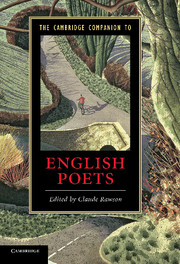Book contents
- Frontmatter
- Introduction
- 1 Geoffrey Chaucer
- 2 Thomas Wyatt
- 3 Edmund Spenser
- 4 William Shakespeare
- 5 John Donne
- 6 Ben Jonson
- 7 George Herbert
- 8 John Milton
- 9 Andrew Marvell
- 10 John Dryden
- 11 Jonathan Swift
- 12 Alexander Pope
- 13 William Blake
- 14 Robert Burns
- 15 William Wordsworth
- 16 Samuel Taylor Coleridge
- 17 George Gordon, Lord Byron
- 18 Percy Bysshe Shelley
- 19 John Keats
- 20 Alfred Lord Tennyson
- 21 Robert Browning
- 22 Emily Brontë
- 23 Christina Rossetti
- 24 Thomas Hardy
- 25 William Butler Yeats
- 26 D. H. Lawrence
- 27 T. S. Eliot
- 28 W. H. Auden
- 29 Philip Larkin
- Further Reading
- Index
25 - William Butler Yeats
Published online by Cambridge University Press: 28 May 2011
- Frontmatter
- Introduction
- 1 Geoffrey Chaucer
- 2 Thomas Wyatt
- 3 Edmund Spenser
- 4 William Shakespeare
- 5 John Donne
- 6 Ben Jonson
- 7 George Herbert
- 8 John Milton
- 9 Andrew Marvell
- 10 John Dryden
- 11 Jonathan Swift
- 12 Alexander Pope
- 13 William Blake
- 14 Robert Burns
- 15 William Wordsworth
- 16 Samuel Taylor Coleridge
- 17 George Gordon, Lord Byron
- 18 Percy Bysshe Shelley
- 19 John Keats
- 20 Alfred Lord Tennyson
- 21 Robert Browning
- 22 Emily Brontë
- 23 Christina Rossetti
- 24 Thomas Hardy
- 25 William Butler Yeats
- 26 D. H. Lawrence
- 27 T. S. Eliot
- 28 W. H. Auden
- 29 Philip Larkin
- Further Reading
- Index
Summary
Whatever else he was, Yeats was a great Victorian poet who lived long enough to become a great modern poet. Notoriously, like Beethoven, he was an artist who changed. Sometimes Yeats was forced to change by the events of his time but, more profoundly, Yeats forced change upon himself, refusing ever to sound the same way twice but never sounding like anyone other than Yeats.
This is how the twenty-seven-year-old Yeats sounded in 1892, when he published his second book of poems, The Countess Kathleen and Various Legends and Lyrics. The poem is called ‘The Sorrow of Love’.
The quarrel of the sparrows in the eaves,
The full round moon and the star-laden sky,
And the loud song of the ever-singing leaves
Had hid away earth’s old and weary cry.
And then you came with those red mournful lips,
And with you came the whole of the world’s tears,
And all the sorrows of her labouring ships,
And all burden of her myriad years.
And now the sparrows warring in the eaves,
The crumbling moon, the white stars in the sky,
And the loud chanting of the unquiet leaves,
Are shaken with earth’s old and weary cry.
This poet has absorbed the music of Rossetti and Swinburne, late nineteenth-century English poets who shied away from the gregariousness of Tennyson and Browning, preferring an incantatory utterance distilled from the larger discursive pool of the dramatic monologue. This poet is also aware of contemporary French poetry, of Mallarmé’s call for a poetry of suggestion, of Verlaine’s desire to wring the neck of rhetoric.
- Type
- Chapter
- Information
- The Cambridge Companion to English Poets , pp. 457 - 474Publisher: Cambridge University PressPrint publication year: 2011

